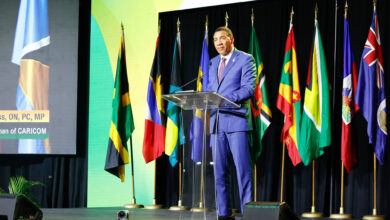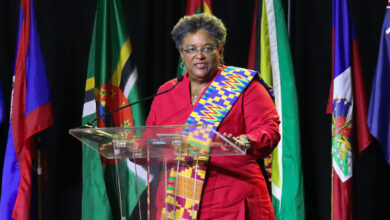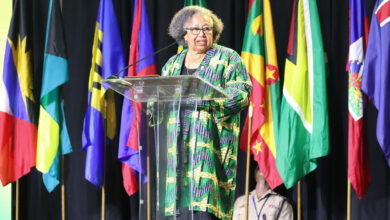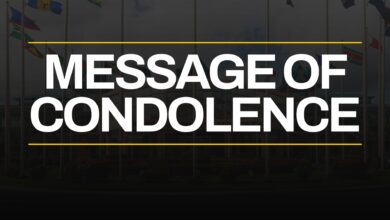The Third Special Meeting of the Legal Affairs Committee comprising Hon. Ministers responsible for Legal Affairs and Attorneys-General of the Caribbean Community was convened in Port-of-Spain, Trinidad and Tobago from 25-29 January 1999 under the distinguished chairmanship of the Hon. Ramesh Lawrence Maharaj, S.C., Attorney-General of Trinidad and Tobago.
The Meeting was attended by Ms. Gertel Thom, Deputy Solicitor General of Antigua and Barbuda; The Hon. Tennyson Wells, Q.C., Attorney-General and Minister of Justice of the Commonwealth of The Bahamas; the Hon. Anthony Peter La Ronde, M.P., Attorney-General, Dominica; the Hon. Charles Ramson, S.C., M.P., Attorney-General and Minister of Legal Affairs, Guyana; Senator The Hon. Arnold J. Nicholson, Q.C., Attorney-General of Jamaica; the Hon. Charles Ekins, Attorney-General of Montserrat; the Hon. Delano Bart, M.P., Attorney-General of St. Kitts and Nevis; the Hon. Petrus Compton, Attorney-General of Saint Lucia; Senator the Hon. Carl Joseph, Attorney-General and Minister of Justice of St. Vincent and the Grenadines; the Hon. Ronald Scipio, Attorney-General of Anguilla, the Hon. Dancia Penn, Q.C., Attorney-General of the British Virgin Islands and Ms. Manorma Soeknandan, Head, Department of Legislation, Advises and International Affairs, Ministry of Justice and Police, Suriname.
The Committee had before it an Agenda which comprised several issues of critical importance for the efficient functioning of the Caribbean Community, including the instruments relating to the establishment of the Caribbean Court of Justice, the Rules of Court and the Seat of the Court, harmonization of approaches to the death penalty in the Community, the draft Agreement to Establish the Regional Justice Protection Programme, the development of legal education and the practice of law in the Community, the Agreement Establishing the Caribbean Regional Organisation for Standards and Quality (CROSQ) and the legal implications of Member States’ participation in the WTO.
The Legal Affairs Committee considered several Instruments relating to the amendment of the Treaty Establishing the Caribbean Community, namely, Protocol IV: Trade Policy; Protocol VI: Transport Policy; Protocol VII: Disadvantaged Countries, Regions and Sectors; and Protocol IX: Rules of Competition, and made appropriate recommendations to the Conference of Heads of Government for consideration at its Tenth Inter-Sessional Meeting scheduled to be convened in Paramaribo, Suriname in March 1999.
The Attorneys-General reaffirmed that there had been regional consensus for the establishment of a Caribbean Court of Justice to replace the jurisdiction of the Judicial Committee of the Privy Council as long as three decades ago and considered the Reports of the Working Committee established to consider and report on the capital and recurrent budgets for the Caribbean Court of Justice. The Legal Affairs Committee also considered the Report of the Working Committee which was established to consider the legal implications of the decision of the Conference of Heads of Government to invest the Caribbean Court of Justice with original jurisdiction in respect of the interpretation and application of the Treaty.
The Attorneys-General considered the Draft Agreement Establishing the Regional Justice Protection Programme together with a draft Justice Protection Bill submitted by the Government of Trinidad and Tobago and established a Technical Committee of Legal Officers to refine the foregoing instruments for endorsement and transmission to the Heads of Government for signature at the upcoming Twentieth Meeting of Conference scheduled to be convened in Port-of-Spain, Trinidad and Tobago in June/July 1999.
In its deliberations, the Committee addressed the policy implications of investing the Caribbean Court of Justice with original jurisdiction in respect of the interpretation and application of the Treaty Establishing the Caribbean Community, as amended, and in particular, the issues relating to the exclusive jurisdiction of the Court, parties to be accorded locus standi in proceedings before the Court, the doctrine of stare decisis in respect of decisions of the Court and the privileges and immunities of the Court, the Regional Judicial and Legal Services Commission, and judges and counsel enjoying a right of audience before the Court.
The Legal Affairs Committee viewed with deep concern the recent decision of the Judicial Committee of the Privy Council in the case of Thomas and Hillaire and finalised a statement and draft resolution for submission to the Tenth Inter-Sessional Meeting of the Conference of Heads of Government on the harmonisation of approaches to the death penalty in the Community.
The Legal Affairs Committee acknowledged that while the International Criminal Court (ICC) recognised the right of countries to implement the death penalty its statutes only provided for a maximum penalty of life imprisonment. However, it was also recognised that it was necessary to be in a position to influence developments with regard to the ICC and to be in such a position, Member States must sign and ratify its Act and Statutes. Accordingly, it was agreed that Member States should sign and ratify the Act and Statutes of the ICC.
The attention of the Legal Affairs Committee was directed to the OAS Second Meeting of Ministers of Justice or Attorneys-General of the Americas to be held on 1-3 March 1999 in Lima, Peru. In view of the importance of the items on the Agenda, the LAC agreed that CARICOM should be represented at the Meeting. It also made arrangements for the preparation of a CARICOM position with regard to items on the Agenda for presentation at the Meeting.
The Legal Affairs Committee established various subordinate bodies to address important issues concerning the establishment of Regional Justice Protection Programme and the development of legal education and the practice of law in the Community and mandated the Secretariat to engage the services of consultants, as required, to examine and submit recommendations on issues relating to reforms in the administration of criminal justice and the law relating to defamation in the various jurisdictions of the Community.
The Fourth Special Meeting of the Legal Affairs Committee is scheduled to be convened in May 1999 at a venue to be determined through consultations between the CARICOM Secretariat and the Member States of the Caribbean Community. It is expected that this Meeting would examine and refine various legal instruments for submission to the Twentieth Meeting of the Conference of Heads of Government scheduled to be convened in Port-of-Spain, Trinidad and Tobago, in July 1999.




